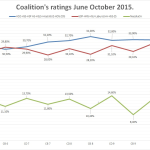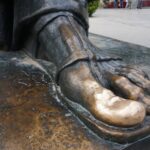The controversial member of Parliament changed sides earlier this year, leaving SDP and starting to vote with the parliamentary majority.
The Office for Suppression of Corruption and Organised Crime (USKOK) filed an indictment against MP Tomislav Saucha and former employee of the Office of the Prime Minister Sandra Zeljko in the so-called ”travel expenses scandal”, announced the State Attorney’s Office on Friday, reports Večernji List on December 8, 2017.
As stated in the press release, USKOK has filed an indictment against the two Croatian nationals with the Zagreb County Court, for criminal offences of abuse of office and power, fraud and counterfeiting of official or business documents.
Saucha was the chief of staff of Prime Minister Zoran Milanović (SDP) from 2011 to January 2016. He is accused of illegally taking hundreds of thousands of kuna from the state budget, which were allocated for the official travel of special advisors to the Prime Minister. However, the advisors didn’t actually travel anywhere, nor did they receive any money for the alleged travel expenses. Saucha, as the chief of staff of the Prime Minister, was in charge of issuing and signing travel documents for official travel, as well as for approving all payments related to travel. Saucha allegedly ordered his secretary Zeljko to prepare documents for travel which never happened.
It is believed that Saucha and Zeljko took hundreds of thousands of kuna. Saucha’s former secretary Zeljko is also accused of continuing the illegal activities after Saucha left the government in January 2016. Her actions allegedly continued until earlier this year, during which period she falsified the signatures of subsequent chiefs of staff to prime ministers, Neven Zelić and Davor Božinović.
From January 2016, Saucha was SDP’s Member of Parliament. However, after the scandal broke out, and Saucha was arrested in February this year, he left SDP and started voting with HDZ, providing the party with the crucial vote against the motion of no confidence against Finance Minister Zdravko Marić in May this year, when the government was on the brink of collapse, after the HDZ-MOST coalition fell apart. His decision to support the government was surprising since Saucha was a longtime member of the opposition party, SDP. His vote raised questions about his motives for suddenly supporting the government. Both he and the government rejected allegations that he switched sides in order to improve his position in the ongoing investigation.
Reacting to the latest news today, Saucha said in Parliament that he couldn’t comment. “I haven’t received the indictment yet; I have to see what the indictment is all about with my attorneys. For me, this is a logical sequence of events. My lawyer will give a brief statement to the media,” said Saucha. “I can only repeat what I’ve been saying for all these months, and that is that I have not done it.”
Given that he is a member of several parliamentary committees, he was asked whether or not he would resign. “The Parliamentary Committee on Legislation has absolutely nothing to do with this, that is a committee just like any other committee. People can call for my resignation, but I thought that the principle of presumption of innocence still applied in Croatia. The fact that the indictment has been filed does not automatically mean that I have been convicted. They are the ones who have to prove that I’m guilty. I know from the very first day that I had nothing to do with it and I’ll certainly prove it,” said Saucha, who claims that his signature on the documents was forged.
He rejected questions about the moral responsibility of politicians. “What moral responsibility? I’m not guilty of what I’ve been charged with. You think that every time someone files an indictment, people should resign? I have had enough problems with all this, and now I should resign? I will not,” said Saucha.
The ruling majority currently has 78 MPs (including Saucha), with 76 votes needed for the government to survive a motion of no confidence. However, Saucha can remain in the Parliament until the final verdict, which is many months and probably years away.








